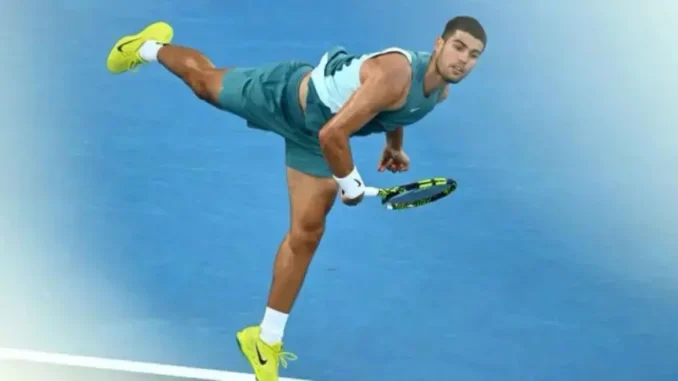
In the ever-evolving landscape of professional tennis, few names have garnered as much attention in recent years as Carlos Alcaraz. The young Spaniard has been lauded for his explosive playing style, remarkable agility, and a forehand that has left many opponents scrambling. However, as with any rising star, his game has come under scrutiny from seasoned observers of the sport. Recently, former top-10 player Andrea Petkovic offered a candid assessment of Alcaraz’s performance, highlighting areas she believes require attention.
Petkovic, known for her insightful commentary, did not mince words when discussing Alcaraz’s game. She emphasized that while Alcaraz possesses undeniable talent, there are moments when his performance can be alarmingly subpar. “When Carlos is bad, he is f***ing horrendous,” she remarked, pointing to a perceived lack of a “plan B” in his strategy. This critique suggests that Alcaraz may struggle to adapt when his primary tactics falter, leading to significant dips in performance.
A particular area of concern highlighted by Petkovic is Alcaraz’s serve. In the modern game, a reliable and versatile serve is crucial, not only as a weapon to win free points but also as a means to set up advantageous positions in rallies. Petkovic observed that Alcaraz’s serve can be inconsistent, lacking the variation needed to keep opponents off balance. This inconsistency can result in missed opportunities and increased pressure during critical junctures of a match.
Moreover, Petkovic noted that Alcaraz’s game plan often remains rigid, even when faced with opponents who have deciphered his strategies. This rigidity can lead to scenarios where, if his initial approach proves ineffective, he struggles to adjust, resulting in unforced errors and a loss of momentum. The absence of a flexible game plan, or “plan B,” can be particularly detrimental against top-tier opponents who are adept at exploiting such predictability.
It’s worth noting that this isn’t the first time Alcaraz’s strategic approach has been questioned. Other commentators have pointed out that while his aggressive baseline play is formidable, there are instances where a more nuanced approach could yield better results. For example, incorporating more variety in shot selection, such as drop shots or slices, could disrupt an opponent’s rhythm and provide Alcaraz with additional avenues to assert control during rallies.
Despite these critiques, it’s essential to recognize the context of Alcaraz’s career. At just 20 years old, he has already achieved milestones that many players can only dream of. His rapid ascent in the rankings and his victories against seasoned professionals speak volumes about his potential and work ethic. The areas of concern highlighted by Petkovic and others are not insurmountable obstacles but rather typical aspects of development for a young athlete transitioning to the highest levels of the sport.
Addressing these critiques could serve as a catalyst for Alcaraz’s growth. By working on the consistency and variety of his serve, he can add a new dimension to his game, making it more challenging for opponents to anticipate and counter his plays. Developing a more flexible game plan would allow him to adapt during matches, shifting tactics in response to an opponent’s strategy and the evolving dynamics of the game.
It’s also important to consider the mental aspect of adapting one’s game. The ability to remain composed under pressure and to think critically during high-stakes situations is a hallmark of the sport’s greatest champions. Alcaraz has already demonstrated remarkable mental fortitude in several high-profile matches, but as Petkovic’s comments suggest, there is room for growth in terms of strategic adaptability.
The path to tennis greatness is rarely linear. Many of the sport’s legends have faced similar critiques early in their careers. What often distinguishes those who reach the pinnacle is their ability to learn from feedback, adapt their games, and continually evolve. Alcaraz has shown a willingness to put in the hard work necessary for improvement, and there is little doubt that he will take these observations to heart as he continues his journey.
In conclusion, while Andrea Petkovic’s assessment may seem pointed, it offers valuable insights into areas where Carlos Alcaraz can enhance his game. By focusing on developing a more versatile serve and embracing a flexible strategic approach, Alcaraz can address these critiques and continue his ascent in the tennis world. As he matures and gains more experience, fans and commentators alike will be keen to see how he evolves and whether he can harness his immense potential to become one of the defining players of his generation.
Leave a Reply